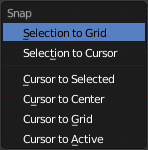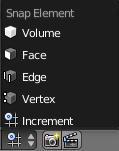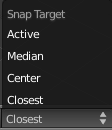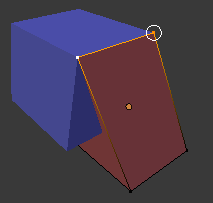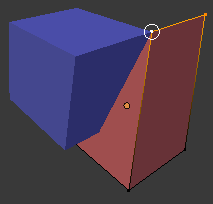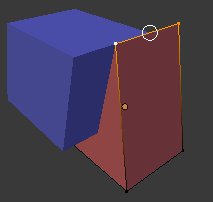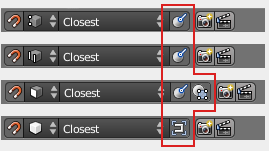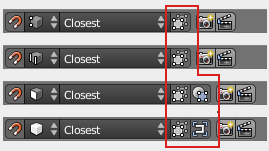「Doc:2.6/Manual/3D interaction/Transform Control/Snap」の版間の差分
(相違点なし)
|
2013年3月5日 (火) 20:14時点における版
Snapping
There are two types of snap operations that you can use in Blender. The first type snaps your selection or cursor to a given point while the second type is used during transformations (translate, rotate, scale) and snaps your selection to elements within the scene.
Snap
Mode: Object and Edit modes
Hotkey: ⇧ ShiftS
The Snap menu (also available from the 3D header in both Object and Edit mode (Object » Snap and Mesh » Snap). This menu provides a number of options to move the cursor or your selection to a defined point (the cursor, selection or the grid).
- Selection to Grid
- Snaps the currently selected object(s) to the nearest grid point.
- Selection to Cursor
- Snaps the currently selected object(s) to the cursor location.
- Cursor to Selected
- Moves the cursor to the center of the selected object(s).
- Cursor to Center
- Moves the cursor to the center of the grid.
- Cursor to Grid
- Moves the cursor to the nearest grid point.
- Cursor to Active
- Moves the cursor to the center of the active object.
Transform Snapping
The ability to snap Objects and Mesh element to various types of scene elements during a transformation is available by toggling the magnet icon (which will turn red) in the 3D view's header buttons.
Snapping Modes
Snap Element
- Volume
- Snaps to regions within the volume of the first Object found below the mouse cursor. Unlike the other options, this one controls the depth (i.e. Z-coordinates in current view space) of the transformed element. By toggling the button that appears to the right of the snap target menu (see below), target objects will be considered as a whole when determining the volume center.
- Face
- Snap to the surfaces of faces in mesh objects. Useful for retopologizing.
- Edge
- Snap to edges of mesh objects.
- Vertex
- Snap to vertices of mesh objects.
- Increment
- Snap to grid points. When in Orthographic view, the snapping increment changes depending on zoom level. Please note: in this context the grid does not mean the visual grid cue displayed. Snapping will use the resolution of the displayed grid, but all transformations are relative to the initial position (before the snap operation).
Snap Target
Snap target options become active when either Vertex, Edge, Face, or Volume is selected as the snap element. These determine what part of the selection snaps to the target objects.
- Active
- move the active element (vertex in Edit mode, object in Object mode) to the target.
- Median
- move the median of the selection to the target.
- Center
- move the current transformation center to the target. Can be used with 3D cursor to snap with an offset.
- Closest
- move the closest point of the selection to the target.
Additional snap options
As seen by the red highlighted areas in the image above, additional controls are available to alter snap behaviour. These options vary between mode (Object and Edit) as well as Snap Element. The four options available are:
 Align rotation with the snapping target.
Align rotation with the snapping target. Project individual elements on the surface of other objects.
Project individual elements on the surface of other objects. Snaps elements to its own mesh.
Snaps elements to its own mesh. Consider Objects as whole when finding volume center.
Consider Objects as whole when finding volume center.
